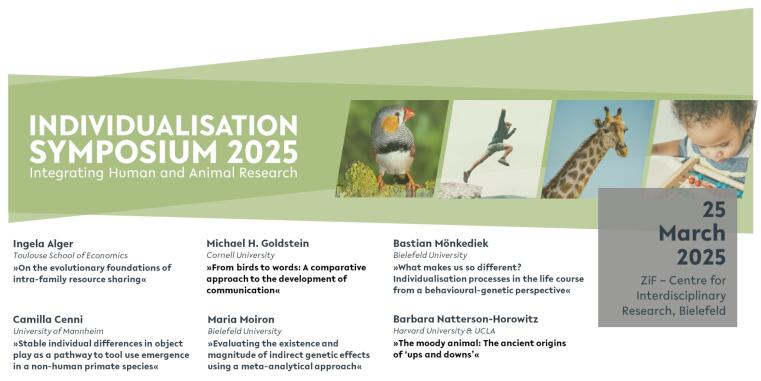
Individualisation Symposium 2025
25 March 2025
The Joint Institute for Individualisation in a Changing Environment (JICE), the collaborative research association InChangE and the Transregio Collaborative Research Centre 212 cordially invited all interested persons to the fourth issue of the interdisciplinary Individualisation Symposium at the Centre for Interdisciplinary Research (ZiF) at Bielefeld University on Tuesday, 25 March 2025.
The event brought together researchers from various disciplines of natural sciences, social sciences and humanities to facilitate the discourse on current findings and new perspectives in individualisation research across disciplinary boundaries.
This year's symposium was dedicated to integrating human and animal research – with a particular focus on transitional periods and turning points across the lifespan.
Photos
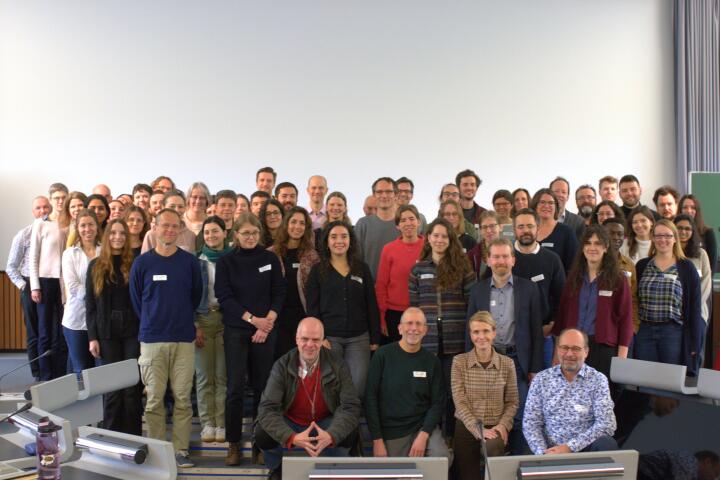
Download
Individualisation Symposium 2025 – Poster
Individualisation Symposium 2025 – Programme
Links
Article by Bielefeld University [de]
Speaker
Ingela Alger
Economics | Toulouse School of Economics & Centre for Economic Policy Research
© Ingela Alger »On the evolutionary foundations of intra-family resource sharing«
Ingela Alger is an economist at Toulouse School of Economics, the National Centre for Scientific Research (CNRS), the University of Toulouse Capitole, the Institute for Advanced Study in Toulouse (IAST) and the Centre for Economic Policy Research (CEPR). By combining economic theory with evolutionary biology, she is committed to understanding the origins of human preferences and motivations as well as the influence of our evolutionary past in shaping our behaviour within the family, such as paternal investment and sharing of resources between men and women.
Camilla Cenni
Cross-Cultural Social and Personality Psychology | University of Mannheim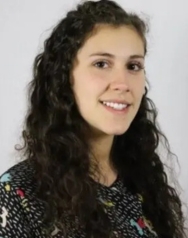
© uleth »Stable individual differences in object play as a pathway to tool use emergence in a non-human primate species«
Camilla Cenni is an ethologist at the Chair of Cross-Cultural Social and Personality Psychology at the School of Social Sciences of the University of Mannheim. Her cross-species research interest includes social learning and behavioural innovation, the role of individual differences in cultural evolution as well as tool use, play behavior and material culture.
Michael H. Goldstein
Developmental Psychobiology | Cornell University
© Michael H. Goldstein »From birds to words: A comparative approach to the development of communication«
Michael H. Goldstein is a professor of developmental psychobiology at the Department of Psychology at Cornell University, where he researches how infants learn to talk through studies on songbirds and humans. Using a unique comparative approach, he delves into which social interactions between caregivers and offspring shape language acquisition. In this way, he improves our understanding of how communication and language develop and the social and cognitive forces underlying these processes.
Website of Michael H. Goldstein
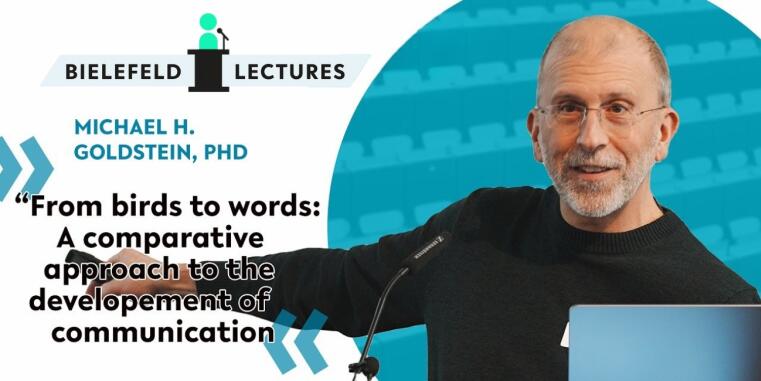
© Universität Bielefeld Maria Moiron
Evolutionary and Behavioural Ecology | Bielefeld University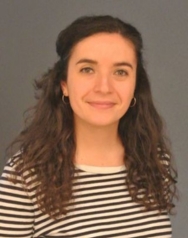
© Maria Moiron »Evaluating the existence and magnitude of indirect genetic effects using a meta-analytical approach«
Maria Moiron is an evolutionary and behavioural ecologist at the Department of Evolutionary Biology at Bielefeld University. Her research focuses on how rapidly changing environmental conditions influence adaptive responses in wild animal populations as well as on the causes and consequences of individual differences in labile traits such as behaviour, life history and physiology.
Bastian Mönkediek
Sociology | Bielefeld University
© Bastian Mönkediek »What makes us so different? Individualisation processes in the life course from a behavioural-genetic perspective«
Bastian Mönkediek is a sociologist at the research unit Social Structure and Social Inequality at Bielefeld University. He is one of the project leaders of the German Twin Family Panel “TwinLife”, which combines research approaches from different disciplines, such as sociology, psychology and human genetics, in a longitudinal study on twin pairs and their families. This sheds light on how social inequalities develop over the life course, taking genetic and social forces as well as their interplay into account.
Barbara Natterson-Horowitz
Cardiology & Evolutionary Biology | Harvard University & University of California, Los Angeles
© Alisha Jucevic »The moody animal: The ancient origins of ‘ups and downs’«
Barbara Natterson-Horowitz is a cardiologist and evolutionary biologist at Harvard Medical School, Harvard University’s Department of Human Evolutionary Biology and the School of Medicine of the University of California, Los Angeles (UCLA). Her research turns to the animal world to solve human health challenges – from heart failure and breast cancer to anxiety disorders and infertility. Through her best-selling books "Zoobiquity" and "Wildhood", she highlights similarities between humans and non-human animals, revealing a new species-spanning approach to health and development.
Website of Barbara Natterson-Horowitz
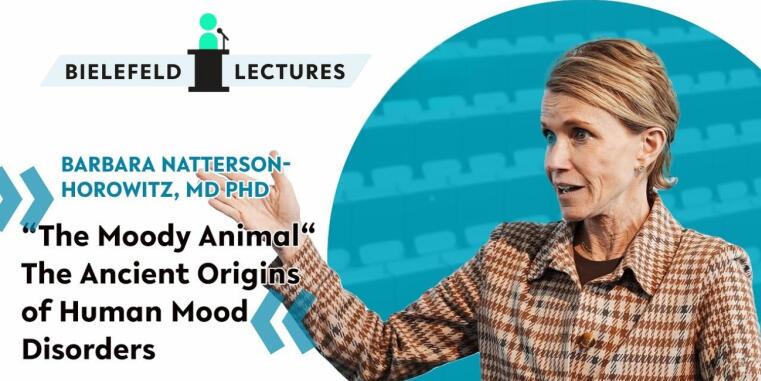
© Universität Bielefeld Recording of the talk by Barbara Natterson-Horowitz on YouTube












